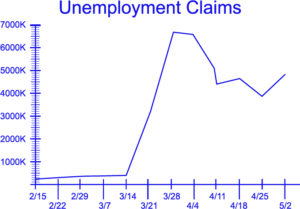As we eagerly await the lifting of stay-home orders across the country, the hearts and minds of Pastors fill with thoughts about regathering the church and ministering to their hurting flock. The implemented stay-at-home orders and mandated closure of businesses in many states has been devastating. What effect this has had on the church will be clear in time, but we know that church will never be the same. However, we have faith that this will all work for God’s purpose. To minister to each other in an effective and meaningful way, it is important to recognize the many challenges Christians are facing—and facing now with much intensity.

1. Unemployment/Uncertain Financial Future
The mandated closure of businesses across the country has led to massive job loss. According to a report by the U.S. Department of Labor, Americans filed over 30 million unemployment claims in the 6-week period ending on April 25th. That is up 95.6% from the previous 6-week period with 1.3 million claims filed. The families of employees who are laid off, furloughed or those self-employed are now facing the threat of poverty and homelessness.
 Government restrictions on evictions and financial institutions that offer debt payment deferrals are too often delaying the inevitable. This is just adding to the burden of a nation with debt at every level, from the federal government down to the average citizen. Although the stimulus checks were a substantial help to many, there is a valid concern that, come next year, the government may not have the funds to foot the bill. How can the government hope to pay for all of this with the reduced tax revenue collected from businesses that were closed and people who had been unemployed for months? Many who rely on government programs like Medicaid, Medicare, etc., may face years of pain and hardship as our country—really, our world—recovers from the economic impact of these actions.
Government restrictions on evictions and financial institutions that offer debt payment deferrals are too often delaying the inevitable. This is just adding to the burden of a nation with debt at every level, from the federal government down to the average citizen. Although the stimulus checks were a substantial help to many, there is a valid concern that, come next year, the government may not have the funds to foot the bill. How can the government hope to pay for all of this with the reduced tax revenue collected from businesses that were closed and people who had been unemployed for months? Many who rely on government programs like Medicaid, Medicare, etc., may face years of pain and hardship as our country—really, our world—recovers from the economic impact of these actions.
2. Frustration/Anger
Many people feel anger and frustration at government overreach, whether real or perceived. Some find frustration in what they consider to be an immense and inconvenient societal overreaction. Others are feeling anger towards those who are pushing back against the mandates and guidelines, fearing that these actions will cause further harm—including higher death tolls—and result in further extensions of the restrictions in place.
Some are feeling an unsettling undercurrent of a new class divide: the exalted “essentials,” versus everyone else who must stay put and rely on the providence of the government and other “essentials.” Finding themselves categorized as “non-essential” will be a shock to many a bread-winner, and for some, it will be a devastating strike to their sense of purpose. Even more surprised are the many small-business owners who have invested everything into an enterprise which the government has now all but tossed aside.
On the other side of this are the essential workers themselves, many of whom would prefer to stay home, fearing that they may become the vector of harm for their loved ones. Add to this having to wear uncomfortable protective gear, wait in line everywhere, deal with shortages of certain sanitary supplies and foods, and—well, just about everyone’s got something to get worked up about!
3. Loneliness/Depression

People all over the world are experiencing these problems, but facing them without the support of family and friends is difficult. Many find themselves in this position. Even those with family and friends nearby may find these people turning to them for support and thus have no one to turn to themselves. Compound this with financial struggle, fear, anxiety, and other stressors and you have a recipe for major depression.
We must recognize that we are now in a hotbed for despair and suicide. Many churches will struggle to provide a community of support to people when they aren’t even able to gather. Each household needs ministering, and now we must somehow do so without personal contact. And just about everyone we know needs a hug right now!
4. Loss of A Loved One/Grief
Losing a loved one during this time is yet another hard hit that many will face. Regardless of the cause of the loss, the inability to gather in remembrance of the loved one only adds to their sorrow. In the best of times, it can take years to process the loss of a loved one. In these times, that process is prime to get off on the wrong foot.
5. Addictions/Relapse

The economic hardship, isolation, and depression will lead some to take up a coping strategy that could lead to addiction, or to relapse into an addiction from which they were recovering. Addictions to illicit or prescription drugs, alcohol, tobacco, gambling, pornography, compulsive buying, excessive entertainment, and comfort eating can quickly take over lives. The relief gained by these distractions is temporary and over time the effects weaken. Even worse, guilt from these moral failures may then contribute to the emotional storm and form a feedback loop that spirals out of control.
6. Private Sin
The life of a Christian is as much a constant struggle against sin as it is a consistent pursuit of God. Romans 7:15 “For that which I do I allow not: for what I would, that do I not; but what I hate, that do I.” Suddenly we have all found ourselves with more time on our hands than we may know how to handle constructively. The well-known proverb goes “idle hands are the Devil’s workshop.” Social distancing and stay-at-home orders have strengthened our ability to keep our private lives opaque and have weakened the effects of accountability and godly influence in our lives.
These conditions provide fertile ground for undefeated strongholds to come roaring to life. Even sin believed to be long-defeated may again rear its ugly head. A Christian with their guard down could be blindsided. They may easily lose these battles and let the old man regain control of their lives.
7. Lukewarm Christianity/Loss of Faith
Lukewarm Christianity has always been a problem for the Church. Sadly, this will worsen for after the hiatus from gathering as a church. As it says in Matthew 24:12 “… the love of many shall wax cold.” Many Christians have neglected to nurture and grow their relationship with the Lord, and some, perhaps because of an addiction or private sin, will have fallen away or backslidden. It may come as a heart-breaking shock to some pastors to see how many in their congregation have been growing in stony or thorny ground all along.
Most heart-breaking of all, some Christians have gone through experiences which have crushed them, and in their pain, they may come to blame God for failing to see them through to what they considered being a proper end. Many will lose faith in a loving God.
8. Underlying (Spiritual) Conditions
A term we hear a lot lately is the term “underlying conditions”. We should consider whether some problems which develop out of these challenges result from “underlying conditions” of a spiritual variety. Grief, pain, fear, and anger are God-given tools. They are our “check engine” lights that alert us to problems of which we may not even be conscious. They themselves only become a problem when they are untended-to and unmoderated.
It is as possible to indulge in anger as it is to indulge in pleasure. Obviously, we should not make the mistake of Job’s friends and carelessly diagnose each other of simply “being in sin” for even the most sanctified will experience these emotions. But sometimes the things which provoked these responses in us are the underlying conditions of poor spiritual health in some area of our life. The Word of God says in Psalm 119:165 “Great peace have they which love thy law: and nothing shall offend them.” That we have failed in some regard to love the law of the Lord is a possibility which we should take in all seriousness.
Perhaps there is in our heart an area of misplaced trust or incorrect belief. 1 Corinthians 11:28 “But let a man examine himself…” We should prayerfully consider our own heart if we falter in the face of these challenges. Have we placed unwarranted trust in our own labor and skill? Have we held unreasonable hope in the abilities of politics and government to solve societal ills? Have we placed too much confidence in man? Has, perhaps, our perspective on the magnitude of the goodness, love, and power of God gone a touch out of focus? You may find this to be the case in your heart, as we have in ours. You will find it in the hearts of some of those to whom you are ministering. Galatians 6:1 “Brethren, if a man be overtaken in a fault, ye which are spiritual, restore such an one in the spirit of meekness; considering thyself, lest thou also be tempted.”
How Do We Minister to Christians Facing These Challenges Effectively?
The foremost tool God has placed at our disposal is the message of the gospel. The good news that there is a God, that He is good, that He loves us. That He wills our good, that He has the power to accomplish His will, that He is faithful to do it, and that He has already accomplished His greatest gift when Jesus Christ died and rose again to redeem us to Himself. Philippians 1:6 “being confident of this very thing, that he which hath begun a good work in you will perform it until the day of Jesus Christ:” It is astounding to no end the grace and peace that is ministered to us simply by keeping this truth in focus!
Our message is the gospel, and our mode is love. Love is the DNA of the church. John 13:35 “By this shall all men know that ye are my disciples, if ye have love one to another.” This love is not merely feckless feelings of goodwill toward one another. No, Christian love is a love that acts. A love that prays. A love that preaches—and lives—the Gospel. A love that has your back. A love that comforts, strengthens, supports, and lifts up. A love that meets needs.
Our message is the gospel, our mode is love, and our model is Christ. It is the will of God for us “to be conformed to the image of his Son…” Romans 8:29. We are called to “be not conformed to this world: but be ye transformed by the renewing of your mind…” Romans 12:2. And the goal of this? That “… Christ be formed in you…” Galatians 4:19. Jesus Christ is our model of love and of the Gospel.
God provides each Christian with the tools to overcome any challenge. Ephesians 6-11 “… having your loins girt about with truth, and having on the breastplate of righteousness; And your feet shod with the preparation of the gospel of peace; Above all, taking the shield of faith, wherewith ye shall be able to quench all the fiery darts of the wicked. And take the helmet of salvation, and the sword of the Spirit, which is the word of God:” Unfortunately, many Christians lack the maturity to use these tools. It is up to those who are strong in Christ to lead and guide the weaker in their growth. This is an excellent time to consider a method modeled by Christ in His earthly ministry: the small group.
The Benefit of Small Groups
Jesus devoted much of His earthly ministry to a small group of just 12 men. He had quite the entourage beyond these twelve, and even greater multitudes frequently congregated to hear Him. He had an even deeper relationship with an inner circle of three disciples and also nurtured special one-on-one relationships with a few disciples. But most often His ministry involved the group of twelve men we call The Disciples.
What that means is that these men were the apprentices of Jesus Christ. They didn’t always know it or even act like it, but they were there so that Christ would be formed in them. Beyond any symbolism behind the selection of 12 persons, we believe that the size of this group was an important factor in the success of the training.
Spread the Load
How many people can you handle at once? If you’re preaching, there’s theoretically no limit. But what if you’re teaching something that must be conveyed by living it as much as by preaching it? What if a personal, apprentice-like relationship is critical to the process? Probably, you’ll be limited to about a dozen or fewer. But those dozen can minister to about a dozen each. And those dozen dozen can minister to about a dozen each again. Well, three layers in and that’s already well over 1500 people being ministered to at an intimate level. A single pastor could never hope to personally minister to every member of a congregation of even 150. But he could invest deeply into 12 and teach them to do the same for 12 more, and very quickly a whole church is being ministered to.

Many churches have already implemented small groups in one form or another. If your church has not yet begun meeting in small groups, now is the perfect time to start. Recent global events will make many leery of large assemblies for a time, and some states will implement a plan to open in phases. Small groups will be able to meet again weeks ahead of the whole church body.
As a model, small groups excel at forming stronger, more deeply edifying relationships in the congregation, and training strong godly leaders who could go on to found more churches. Groups formed around specific topics may deeply study in the Word of God in a life-changing way.
Small groups provide a place for growing Christians to ask questions and pray more directly for the more intimate aspects of each other’s lives. Small groups spread the load of fostering growth and ministering to saints over multiple small group leaders who are all led by the pastor. With a team of people willing and enabled to minister and lead, the burden will be lighter—perhaps as light as Christ had intended?
Encourage Small Groups to Stay Connected
If your church already meets in small groups, this is a great time to invest more deeply into them. Encourage your small group leaders to check in on each person in their small group regularly. Perhaps daily, but at the least several times a week. Small group leaders should encourage their small group to stay faithful to their daily, personal Bible study. Perhaps they can host live-streamed meetings. They should continue to share prayer requests and praises with each other to keep their love for one another growing. “Confess [your] faults one to another, and pray one for another, that ye may be healed. The effectual fervent prayer of a righteous man availeth much.” James 5:16
It is often said from the pulpit that each member of the congregation is a part of the church every day of the week. This is true, but often the gap between being a church member on Sunday morning and being an individual on Thursday afternoon is hard to close in practice. How are we the church every day, in a practical sense? Through small groups. Small groups that love with a love that acts. A love that prays. A love that preaches—and lives—the Gospel. A love that has your back. A love that comforts, strengthens, supports, and lifts up. A love that meets needs.




